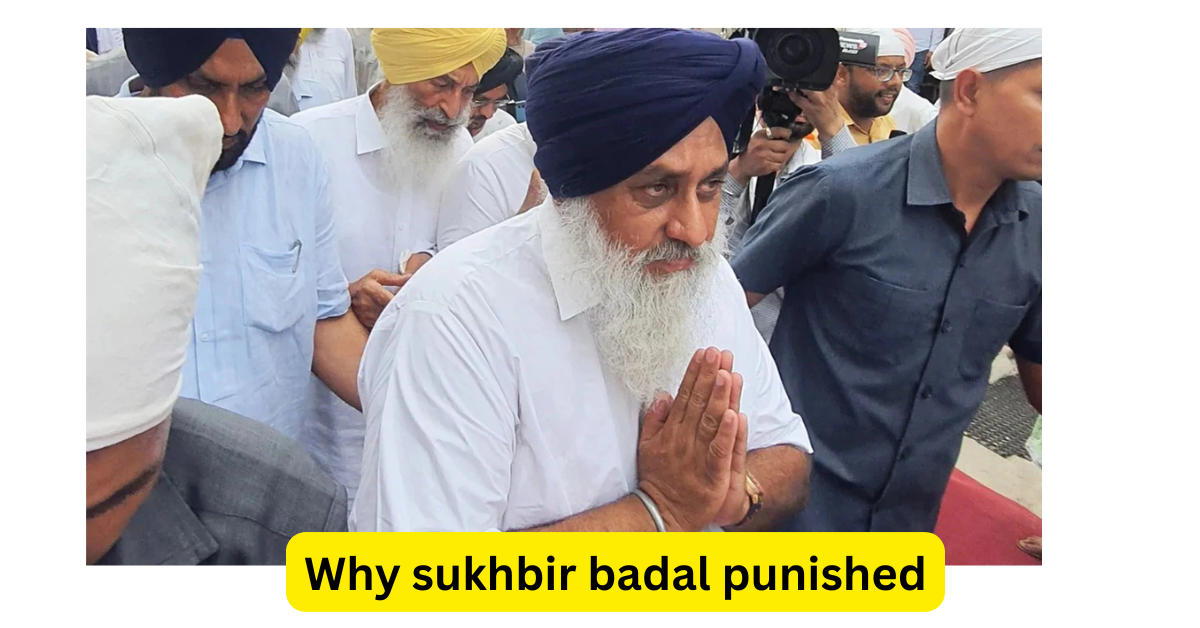Why Sukhbir Badal Was Punished: Sukhbir Singh Badal, a prominent political figure in Punjab, has recently been in the spotlight for reasons that have stirred significant public interest. The former Deputy Chief Minister and ex-president of the Shiromani Akali Dal (SAD) was subjected to a unique form of punishment by the Akal Takht, the highest temporal authority of the Sikh community. This blog delves into the reasons behind why Sukhbir Badal was punished, the implications of this decision, and its broader impact on Punjab’s political landscape.
Background of Sukhbir Badal’s Punishment
The Akal Takht’s decision to punish Sukhbir Badal stems from a series of controversial actions and decisions taken during his tenure as Deputy Chief Minister from 2007 to 2017. One of the most significant incidents that led to his punishment was the 2015 sacrilege case involving the Guru Granth Sahib, the central holy scripture of Sikhism. The sacrilege incident, which involved the desecration of the holy book, sparked widespread outrage and protests across Punjab
The Sacrilege Case and Its Aftermath
The sacrilege case is a pivotal reason why Sukhbir Badal was punished. During the SAD-BJP coalition government, there were allegations that the administration failed to take appropriate action against the perpetrators of the sacrilege. Moreover, the police firing on protesters at Kotkapura and Behbal Kalan, which resulted in the deaths of two Sikh protesters, further fueled public anger
These incidents were seen as a failure of the government to protect religious sentiments and maintain law and order.
Religious Misconduct and the Role of Akal Takht
The Akal Takht declared Sukhbir Badal “tankhaiya,” meaning guilty of religious misconduct. This declaration was based on several factors, including the perceived favoritism towards the Dera Sacha Sauda chief, Gurmeet Ram Rahim Singh, who was involved in the sacrilege case. The Akal Takht accused Sukhbir Badal of compromising Sikh principles by allegedly seeking a pardon for the Dera chief, which was seen as a betrayal by many in the Sikh community
The Punishment: Acts of Public Penance
As part of his punishment, Sukhbir Badal was ordered to perform acts of public penance at the Golden Temple in Amritsar. This included cleaning bathrooms, washing utensils, and serving langar (community kitchen) to devotees. These acts of penance were intended to be a form of atonement for his alleged misdeeds and to restore his standing within the Sikh community
The sight of a prominent political leader engaging in such humble tasks was both symbolic and significant.
Political Implications of the Punishment
The punishment of Sukhbir Badal has far-reaching political implications. It highlights the deep-rooted influence of religious institutions in Punjab’s politics. The Akal Takht’s decision to punish a high-ranking political leader underscores the importance of religious accountability and the expectation that political leaders adhere to Sikh values and principles. This move has also led to calls for introspection within the Shiromani Akali Dal and has prompted discussions about the need for reform and transparency within the party
Public Reaction and Media Coverage
The public reaction to Sukhbir Badal’s punishment has been mixed. While some view it as a necessary step to uphold religious integrity, others see it as a politically motivated move. Media coverage has been extensive, with various news outlets providing detailed accounts of the events leading up to the punishment and the subsequent actions taken by Sukhbir Badal. The widespread coverage has ensured that the issue remains in the public eye, prompting ongoing debates and discussions
The Future of Sukhbir Badal and SAD
The future of Sukhbir Badal and the Shiromani Akali Dal remains uncertain. The punishment has undoubtedly tarnished his reputation and has raised questions about his leadership. However, it also presents an opportunity for the party to undertake significant reforms and rebuild its image. The SAD’s response to this crisis will be crucial in determining its future trajectory and its ability to regain the trust of the Sikh community.
Also Read: Jasdeep Singh Gill Biography
Conclusion
In conclusion, the punishment of Sukhbir Badal by the Akal Takht is a landmark event that underscores the complex interplay between religion and politics in Punjab. The reasons why Sukhbir Badal was punished are deeply rooted in the sacrilege case and the perceived failures of his administration. The acts of public penance he has been ordered to perform are a testament to the importance of religious accountability. As the situation continues to unfold, it will be interesting to see how Sukhbir Badal and the Shiromani Akali Dal navigate this challenging period and what steps they take to restore their standing within the Sikh community.
By understanding why Sukhbir Badal was punished, we gain insight into the broader dynamics of Punjab’s political and religious landscape. This case serves as a reminder of the significant role that religious institutions play in shaping political discourse and the expectations placed on political leaders to uphold religious values and principles.

